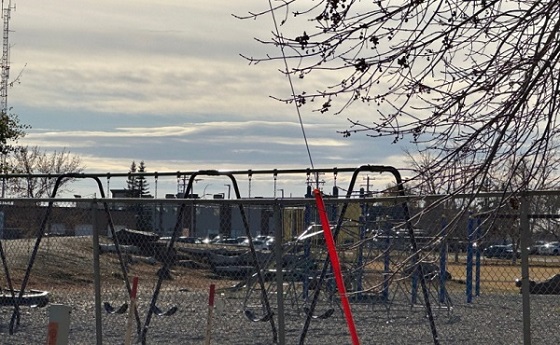Addictions
Change to B.C. drug decriminalization policy prohibits use near playgrounds, parks
People are framed by wildflowers while walking a dog on a pathway at Garry Point Park, in Richmond, B.C., on Thursday, May 18, 2023. The B.C. government says its drug decriminalization policy has been amended to stop people from using illegal substances near playgrounds and parks.THE CANADIAN PRESS/Darryl Dyck
Vancouver
The British Columbia government says its drug decriminalization policy has been amended to stop people from using illegal substances near playgrounds and parks.
The Ministry of Mental Health and Addictions says in a statement that the federal government approved the changes to its drug decriminalization policy.
The federal government gave the province an exemption from the law in May last year to allow for the removal of criminal penalties for people caught with a small amount of illicit drugs for personal use.
The new changes mean illegal drug possession within 15 metres of playgrounds, waterparks and skate parks will be prohibited as of Sept. 18, although possession was already prohibited on school grounds and in child-care facilities.
The provincial government says the amendments mean police can again enforce federal drug laws if people are found with illegal drugs near “child-focused spaces.”
Victoria Mayor Marianne Alto says in the statement that while decriminalization is one part of the response to the toxic drug crisis, it’s important to take steps that specifically protect children.
Vancouver Mayor Ken Sim says the city had asked the provincial government to get Health Canada to make the change.
“This is a positive step forward in helping to find balance for our communities, including families, seniors, children, and our most vulnerable residents,” he said in a statement issued Thursday.
This report by The Canadian Press was first published Sept. 14, 2023.
Addictions
Activists Claim Dealers Can Fix Canada’s Drug Problem

By Adam Zivo
We should learn from misguided experiments with activist-driven drug ideologies.
Some Canadian public-health researchers have argued that the nation’s drug dealers, far from being a public scourge, are central to the cause of “harm reduction,” and that drug criminalization makes it harder for them to provide this much-needed “mutual aid.” Incredibly, these ideas have gained traction among Canada’s policymakers, and some have even been put into practice.
Gillian Kolla, an influential harm-reduction activist and researcher, spearheaded the push to whitewash drug trafficking in Canada. Over the past decade, she has advocated for many of the country’s failed laissez-faire drug policies. In her 2020 doctoral dissertation, she described her hands-on research into Toronto’s “harm reduction satellite sites”—government-funded programs that paid drug users to provide services out of their homes.
The sites Kolla studied were operated by the nonprofit South Riverdale Community Health Centre (SRCHC) in Toronto. Addicts participating in the programs received $250 per month in exchange for distributing naloxone and clean paraphernalia (needles and crack pipes, for example), as well as for reversing overdoses and educating acquaintances on safer consumption practices. At the time of Kolla’s research (2016–2017), the SRCHC was operating nine satellite sites, which reportedly distributed about 1,500 needles and syringes per month.
Canada permits supervised consumption sites—facilities where people can use drugs under staff oversight—to operate so long as they receive an official exemption via the federal Controlled Drugs and Substances Act. As the sites Kolla observed did not receive exemptions, they were certainly illegal. Kolla herself acknowledged this in her dissertation, writing that she, with the approval of the University of Toronto, never recorded real names or locations in her field notes, in case law enforcement subpoenaed her research data.
Even so, the program seems to have enjoyed the blessing of Toronto’s public health officials and police. The satellite sites received local funding from 2010 onward, after a decade of operating on a volunteer basis, apparently with special protection from law enforcement. In her dissertation, Kolla described how SRCHC staff trained police officers to leave their sites alone, and how satellite-site workers received special ID badges and plaques to ward off arrest.
Kolla made it clear that many of these workers were not just addicts but dealers, too, and that tolerance of drug trafficking was a “key feature” of the satellite sites. She even described, in detail, how she observed one of the site workers packaging and selling heroin alongside crackpipes and needles.
In her dissertation, Kolla advocated expanding this permissive approach. She claimed that traffickers practice harm reduction by procuring high-quality drugs for their customers and avoiding selling doses that are too strong.
“Negative framings of drug selling as predatory and inherently lacking in care make it difficult to perceive the wide variety of acts of mutual aid and care that surround drug buying and selling as practices of care,” she wrote.
In truth, dealers routinely sell customers tainted or overly potent drugs. Anyone who works in the addiction field can testify that this is a major reason that overdose deaths are so common.
Ultimately, Kolla argued that “real harm reduction” should involve drug traffickers, and that criminalization creates “tremendous barriers” to this goal.
The same year she published her dissertation, Kolla cowrote a paper in the Harm Reduction Journal with her Ph.D. supervisor at the Dalla Lana School of Public Health. The article affirmed the view that drug traffickers are essential to the harm-reduction movement. Around this time, the SRCHC collaborated with the Toronto-based Parkdale Queen West Community Health Centre— the only other organization running such sites—to produce guidelines on how to replicate and scale up the experiment.
Thankfully, despite its local adoption, this idea did not catch on at the national level. It was among the few areas in the early 2020s where Canada did not fully descend into addiction-enabling madness. Yet, like-minded researchers still echo Kolla’s work.
In 2024, for example, a group of American harm-reduction advocates published a paper in Drug and Alcohol Dependence Reports that concluded, based on just six interviews with drug traffickers in Indianapolis, that dealers are “uniquely positioned” to provide harm-reduction services, partly because they are motivated by “the moral imperative to provide mutual aid.” Among other things, the authors argued that drug criminalization is harmful because it removes dealers from their social networks and prevents them from enacting “community-based practices of ethics and care.”
It’s instructive to review what ultimately happened with the originators of this movement—Kolla and the SRCHC. Having failed to whitewash drug trafficking, Kolla moved on to advocating for “safer supply”—an experimental strategy that provides addicts with free recreational drugs to dissuade use of riskier street substances. The Canadian government funded and expanded safer supply, thanks in large part to Kolla’s academic work. It abandoned the experiment after news broke that addicts resell their safer supply on the black market to buy illicit fentanyl, flooding communities with diverted opioids and fueling addiction.
The SRCHC was similarly discredited after a young mother, Karolina Huebner-Makurat, was shot and killed near the organization’s supervised consumption site in 2023. Subsequent media reports revealed that the organization had effectively ignored community complaints about public safety, and that staff had welcomed, and even supported, drug traffickers. One of the SRCHC’s harm-reduction workers was eventually convicted of helping Huebner-Makurat’s shooter evade capture by hiding him from the police in an Airbnb apartment and lying to the police.
There is no need for policymakers to repeat these mistakes, or to embrace its dysfunctional, activist-driven drug ideologies. Let this be another case study of why harm-reduction policies should be treated with extreme skepticism.
Our content is always free
If you want to help us commission more high-quality journalism,
consider getting a voluntary paid subscription.
Addictions
Canadian gov’t not stopping drug injection sites from being set up near schools, daycares

From LifeSiteNews
Canada’s health department told MPs there is not a minimum distance requirement between safe consumption sites and schools, daycares or playgrounds.
So-called “safe” drug injection sites do not require a minimum distance from schools, daycares, or even playgrounds, Health Canada has stated, and that has puzzled some MPs.
Canadian Health Minister Marjorie Michel recently told MPs that it was not up to the federal government to make rules around where drug use sites could be located.
“Health Canada does not set a minimum distance requirement between safe consumption sites and nearby locations such as schools, daycares or playgrounds,” the health department wrote in a submission to the House of Commons health committee.
“Nor does the department collect or maintain a comprehensive list of addresses for these facilities in Canada.”
Records show that there are 31 such “safe” injection sites allowed under the Controlled Drugs And Substances Act in six Canadian provinces. There are 13 are in Ontario, five each in Alberta, Quebec, and British Columbia, and two in Saskatchewan and one in Nova Scotia.
The department noted, as per Blacklock’s Reporter, that it considers the location of each site before approving it, including “expressions of community support or opposition.”
Michel had earlier told the committee that it was not her job to decide where such sites are located, saying, “This does not fall directly under my responsibility.”
Conservative MP Dan Mazier had asked for limits on where such “safe” injection drug sites would be placed, asking Michel in a recent committee meeting, “Do you personally review the applications before they’re approved?”
Michel said that “(a)pplications are reviewed by the department.”
Mazier stated, “Are you aware your department is approving supervised consumption sites next to daycares, schools and playgrounds?”
Michel said, “Supervised consumption sites were created to prevent overdose deaths.”
Mazier continued to press Michel, asking her how many “supervised consumption sites approved by your department are next to daycares.”
“I couldn’t tell you exactly how many,” Michel replied.
Mazier was mum on whether or not her department would commit to not approving such sites near schools, playgrounds, or daycares.
An injection site in Montreal, which opened in 2024, is located close to a kindergarten playground.
Conservative Party leader Pierre Poilievre has called such sites “drug dens” and has blasted them as not being “safe” and “disasters.”
Records show that the Liberal government has spent approximately $820 million from 2017 to 2022 on its Canadian Drugs and Substances Strategy. However, even Canada’s own Department of Health admitted in a 2023 report that the Liberals’ drug program only had “minimal” results.
Recently, LifeSiteNews reported that the British Columbia government decided to stop a so-called “safe supply” free drug program in light of a report revealing many of the hard drugs distributed via pharmacies were resold on the black market.
British Columbia Premier David Eby recently admitted that allowing the decriminalization of hard drugs in British Columbia via a federal pilot program was a mistake.
Former Prime Minister Justin Trudeau’s loose drug initiatives were deemed such a disaster in British Columbia that Eby’s government asked Trudeau to re-criminalize narcotic use in public spaces, a request that was granted.
Official figures show that overdoses went up during the decriminalization trial, with 3,313 deaths over 15 months, compared with 2,843 in the same time frame before drugs were temporarily legalized.
-

 COVID-197 hours ago
COVID-197 hours agoNew report warns Ottawa’s ‘nudge’ unit erodes democracy and public trust
-

 Bruce Dowbiggin2 days ago
Bruce Dowbiggin2 days agoBurying Poilievre Is Job One In Carney’s Ottawa
-

 Health2 days ago
Health2 days agoDisabled Canadians petition Parliament to reverse MAiD for non-terminal conditions
-

 Great Reset2 days ago
Great Reset2 days agoEXCLUSIVE: A Provincial RCMP Veterans’ Association IS TARGETING VETERANS with Euthanasia
-

 COVID-192 days ago
COVID-192 days agoCovid Cover-Ups: Excess Deaths, Vaccine Harms, and Coordinated Censorship
-

 Daily Caller2 days ago
Daily Caller2 days agoSpreading Sedition? Media Defends Democrats Calling On Soldiers And Officers To Defy Chain Of Command
-

 Digital ID2 days ago
Digital ID2 days agoLeslyn Lewis urges fellow MPs to oppose Liberal push for mandatory digital IDs
-

 Crime1 day ago
Crime1 day agoHow Global Organized Crime Took Root In Canada







